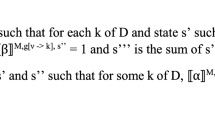Abstract
I address the assumption that communicative interaction is made possible by knowledge of a language. I argue that this assumption as it is usually expressed depends on an unjustified reification of language, and on an unsatisfactory understanding of ‘knowledge’. I propose instead that communicative interaction is made possible by (Rylean) know-how and by the development of (Davidsonian) passing theories. We then come to see that our focus ought to be, not on propositional knowledge of a language which we internally represent, but on the practical application of know-how in our understanding and interpretation of others.
Similar content being viewed by others
Notes
See Simpson (1992) for discussion of these arguments in the context of speech act theory.
Bengson and Moffett (2010): §2), also claim that ability is not necessary for know-how, but they think, further, that cases in which someone is able to complete a complex task without knowing what the intermediate steps will be, show that ability is not sufficient for know-how. Their defence of the claim of insufficiency depends, I think, on mis-describing scenarios. Their hiker, who is able to get to her car but does not, on setting out, know how she will do it, does know how to navigate in the sort of conditions she is in. That is why she is able. In this regard she is like a proficient pianist, who knows how to sight-read, or a proficient reader or, for that matter, someone who knows how to walk, or how to talk.
After explaining the embodied and situated nature of abilities, Noë notes also the way the development of abilities affects our attitudes, and enables us to have experiences that we could not have otherwise (2005: 285). If we do think that there is mode of presentation difference regarding the instructor who learns the trick, the feedback processes Noë refers to give reason to think that the change of mode follows the development of know-how. See also Simpson 2008 regarding the way developed skills feed back to the agent.
Patricia Hanna (2006) objects to Dummett’s comparison of speaking Spanish and swimming, and insists on an intermediate category of activities, which she calls ‘skills which we know-how to perform’ (Hanna 2006: 273). These are purposive and have criteria of correctness, but agents do not require any knowledge-that to perform them. She places language in this category. In the third group, rules guide behaviour; in the second group, behaviour accords with rules (Hanna 2006: 274). I think that Hanna grants too much to the intellectualist, and that she leaves herself vulnerable to the suggestion that skills as know-how are dependent on reasoned or intellectual skills.
See Simpson (2003) for a more detailed discussion.
My thanks to Richard Menary and Britt Harrison for valuable comments on earlier drafts. My thanks to Robert Dunn for discussions of Ryle and Davidson. Work on this paper has been supported by an Australian Research Council Discovery Grant (DP1095109), and by research leave provided by the University.
References
Abbott, B. (2006), ‘Linguistic solutions to philosophical problems’, https://www.msu.edu/∼abbottb/abbott-lingsols.pdf.
Bengson, J., & Moffett M. (2010). ‘Non-propositional Intellectualism’. In J. Bengson & M. Moffett (eds), Knowing how: Essays on knowledge, mind and action. Oxford: Oxford University Press (forthcoming).
Davidson, Donald. (1979). Moods and performances. In D. Davidson (Ed.), Inquiries into truth and interpretation (pp. 109–122). Oxford: Oxford University Press.
Davidson, D. (1982). Communication and convention. In D. Davidson (Ed.), Inquiries into truth and interpretation (pp. 265–280). Oxford: Oxford University Press.
Davidson, D. (1986). A nice derangement of epitaphs. In E. LePore (Ed.), Truth and interpretation: Perspectives on the philosophy of Donald Davidson (pp. 433–446). Oxford: Blackwell.
Davidson, D. (1994). The social aspect of language. In B. McGuinnes & G. Oliveri (Eds.), The philosophy of Michael Dummett (pp. 1–16). Dortrecht: Kluwer.
Devitt, M., & Sterelny, K. (1999). Language and reality: An introduction to the philosophy of language (2nd ed.). Cambridge: Bradford.
Dummett, M. (1976). What is a theory of meaning? II. In M. Dummett (Ed.), The seas of Language (pp. 34–93). Oxford: Oxford University Press. 1993.
Dummett, M. (1978). What do I know when I know a language? In M. Dummett (Ed.), The seas of Language (pp. 94–105). Oxford: Oxford University Press. 1993.
Dummett, M. (1986). A nice derancement of epitaphs: Some comments on Davidson and Hacking. In E. LePore (Ed.), Truth and interpretation: Perspectives on the philosophy of Donald Davidson. Oxford: Blackwell.
Gallagher, S. (2001). The practice of mind: theory, simulation or primary interaction? Journal of Consciousness Studies, 8(5–7), 83–108.
Gallagher, S., & Hutto, D. (2007). Understanding others through primary interaction and narrative practice. In J. Zlatev, T. Racine, C. Sinha, & E. Itkonen (Eds.), The shared mind: Perspectives on intersubjectivity. Amsterdam: Benjamins.
Hanna, P. (2006). Swimming and speaking Spanish. Philosophia, 34, 267–285.
Koethe, J. (2002). Stanley and Williamson on knowing how. Journal of Philosophy, 99(6), 325–328.
Noë, A. (2005). Against intellectualism. Analysis, 65(4), 278–90.
Rumfitt, I. (2003). Savoir faire. The Journal of Philosophy, 100, 158–66.
Ryle, G. (1949). The concept of mind. London: Hutchinson.
Simpson, D. (1992). Communicative skills and the constitution of illocutionary acts. Australasian Journal of Philosophy, 70, 82–92.
Simpson, D. (2003). Interpretation and skill: On passing theory. In G. Preyer, G. Peter, & M. Ulkan (Eds.), Concepts of meaning: Framing an integrated theory of linguistic behavior (pp. 251–266). Dordrecht: Kluwer.
Simpson, D. (2008). Irony, dissociation and the self. Journal of Consciousness Studies, 15(6), 119–135.
Stanley, J., & Williamson, T. (2001). Knowing how. Journal of Philosophy, 98(8), 411–444.
Author information
Authors and Affiliations
Corresponding author
Rights and permissions
About this article
Cite this article
Simpson, D. Language and know-how. Phenom Cogn Sci 9, 629–643 (2010). https://doi.org/10.1007/s11097-010-9183-x
Published:
Issue Date:
DOI: https://doi.org/10.1007/s11097-010-9183-x




